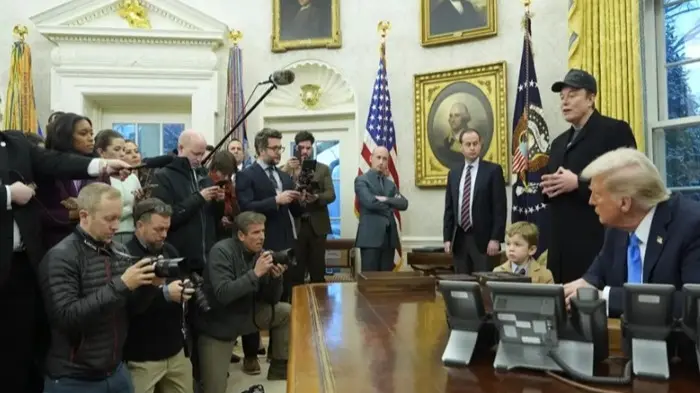Updated 14 February 2025 at 15:36 IST
‘We Reserve The Right’: Why AP Journalists Were Barred From White House Events
White House bans AP journalists from Oval Office events over a dispute on renaming the 'Gulf of Mexico' as the 'Gulf of America'.
- World News
- 3 min read

Washington: The White House has come under fire after barring Associated Press (AP) journalists from multiple presidential events, citing the news agency’s refusal to use President Donald Trump ’s newly decreed name for the Gulf of Mexico—‘Gulf of America.’
On Wednesday, White House Press Secretary Karoline Leavitt defended the administration’s stance, asserting that news outlets refusing to adopt the new name were “telling lies.” She insisted that the federal government had officially codified the name change, and most media organizations had acknowledged it.
However, the AP has maintained its adherence to the traditional geographical term, noting Trump’s decision while continuing to use ‘Gulf of Mexico’ in its reports.
AP Reporters Blocked From Key Events
The dispute escalated on Tuesday when AP journalists were denied access to events in the Oval Office and the Diplomatic Reception Room. The restrictions continued on Wednesday when an AP reporter attending Leavitt’s daily briefing was later barred from covering the swearing-in ceremony of Tulsi Gabbard as National Intelligence Director.
Advertisement
Julie Pace, AP’s senior vice president and executive editor, strongly condemned the move in a letter to White House Chief of Staff Susie Wiles, stating, “The actions taken by this White House were plainly intended to punish the AP for the content of its speech. It is among the most basic tenets of the First Amendment that the government cannot retaliate against the public or the press for what they say.”
White House Defends Restrictions
Responding to criticism, Leavitt maintained that the White House had the authority to control media access, particularly to the Oval Office. “Nobody has the right to go into the Oval Office and ask the president of the United States questions,” she said. “We reserve the right to decide who gets to go into the Oval Office.”
Advertisement
Traditionally, when space is limited, a small press pool, including AP journalists, is granted access to White House events to ensure broad dissemination of news. The latest restrictions mark a significant departure from this precedent and have raised alarm among media rights advocates.
Media And Legal Experts Express Concern
The decision to block AP reporters has drawn sharp rebukes from press freedom organizations and legal experts. Renowned First Amendment attorney Floyd Abrams criticized the move, stating, “Barring an AP journalist from covering an Oval Office event because the AP has not adopted President Trump’s change of name to what has long been called the Gulf of Mexico is an affront to the First Amendment.”
The Inter-American Press Association (IAPA), a major consortium of news organizations, also condemned the White House’s actions. IAPA President José Roberto Dutriz described the move as “an act of censorship and intimidation,” warning that it sets a dangerous precedent for press freedom in the U.S. “Restricting press coverage and warning against the AP demonstrates a troubling intention to impose official criteria on public interest information, with the threat of reprisals for those who do not comply,” he said.
Published By : Surabhi Shaurya
Published On: 14 February 2025 at 15:33 IST
